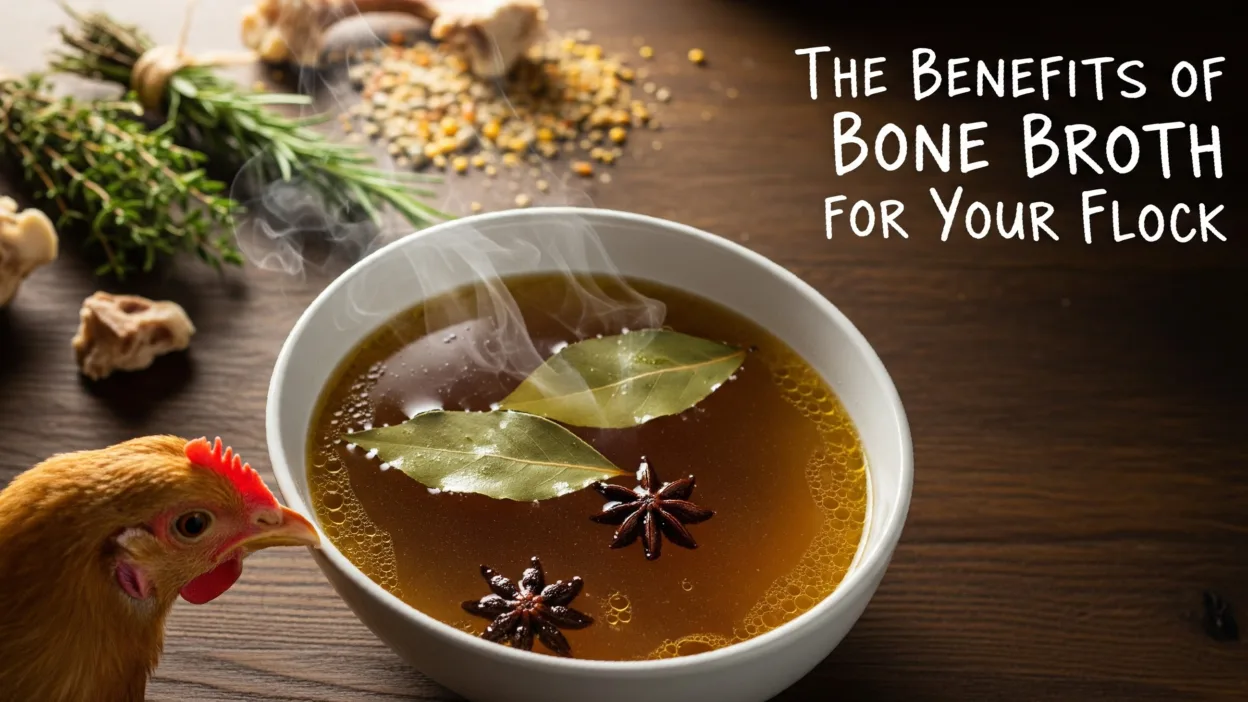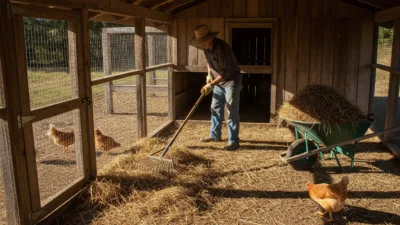Backyard chicken keepers are always on the lookout for natural, budget-friendly ways to boost flock health. One rising trend in poultry care is feeding bone broth to chickens. Bone broth has long been a superfood in human nutrition, but it also provides incredible benefits for chickens when given correctly. Packed with minerals, amino acids, and collagen, bone broth can support your hens’ immune system, digestive health, and even improve egg quality.
In this guide, we’ll cover everything you need to know about bone broth for chickens, including its benefits, safe usage, and a step-by-step recipe you can make right at home.
What Is Bone Broth for Chickens?
Bone broth is a nutrient-dense liquid made by simmering animal bones (commonly chicken or beef) in water for an extended period. The slow cooking process extracts minerals like calcium, magnesium, phosphorus, and potassium, as well as amino acids and gelatin.
When added to your chickens’ diet, bone broth acts as a natural supplement that improves their overall health, especially during cold winter months, molting seasons, or times of stress.
Benefits of Bone Broth for Chickens
1. Boosts Immunity
Chickens often face stress from predators, weather changes, or overcrowding. Bone broth contains amino acids such as glycine and proline that strengthen the immune system. The natural collagen also supports a healthier gut lining, which is critical for nutrient absorption and resistance to disease.
2. Improves Digestive Health
Bone broth is soothing for the digestive tract. Chickens that suffer from diarrhea, parasites, or digestive stress can benefit from the gelatin in broth, which coats the stomach lining and helps repair tissue damage.
3. Supports Feather Growth During Molting
Molting requires high amounts of protein and minerals. Bone broth provides both in an easily digestible liquid form, helping feathers grow back stronger and faster.
4. Increases Hydration in Hot or Cold Weather
Chickens sometimes avoid drinking plain water, especially during very hot or cold days. Offering warm bone broth in winter encourages hydration and keeps their bodies warm. In summer, diluted cooled broth helps replenish lost electrolytes.
5. Promotes Strong Eggshells
Calcium and phosphorus from bones are slowly released during the cooking process, supporting healthy eggshell development. Hens given bone broth regularly may produce eggs with fewer thin or brittle shells.
6. A Natural Energy Booster
Bone broth is full of minerals and protein that provide chickens with an energy boost. This is especially helpful for older hens, weak pullets, or those recovering from illness.
When to Feed Bone Broth to Chickens
While bone broth is not an everyday staple, it works best as a supplement during special times, such as:
- Winter: To help keep chickens warm and hydrated.
- Molting Season: To support protein needs and faster feather regrowth.
- After Illness or Stress: To help them recover naturally.
- For Older Hens: To give extra nutrition when they slow down egg production.
Offer it once or twice a week in small amounts alongside their regular diet.
How to Prepare Bone Broth for Chickens
Making bone broth is simple, cost-effective, and uses scraps that might otherwise be wasted. Here’s a beginner-friendly recipe:
Ingredients:
- 2–3 pounds of leftover bones (chicken, turkey, or beef)
- 2–3 garlic cloves (optional, for immune support)
- A splash of apple cider vinegar (to extract minerals from bones)
- 1–2 carrots or vegetable scraps (optional, for added nutrients)
- Enough water to cover the bones in a large pot
Instructions:
- Prepare the Bones: Use raw or cooked bones from your kitchen. Rinse if heavily seasoned to avoid excess salt.
- Add Ingredients to Pot: Place bones, garlic, apple cider vinegar, and veggies into a large pot or slow cooker.
- Cover with Water: Fill until everything is submerged.
- Simmer Slowly: Bring to a boil, then reduce heat and simmer for 12–24 hours. The longer it simmers, the richer the broth.
- Strain the Liquid: Remove bones and vegetable scraps. Allow the broth to cool completely.
- Serve to Chickens: Offer it warm in winter or chilled in summer. You can pour it into a shallow dish, mix it with their feed, or freeze it in ice cube trays for later use.
Safety Tips for Feeding Bone Broth to Chickens
- Avoid Excess Salt: Too much salt can harm chickens, so always rinse bones from heavily seasoned meals.
- No Onions or Spices: Onion and certain seasonings are toxic to poultry. Stick with plain bones, garlic, and veggies.
- Use in Moderation: Bone broth should complement, not replace, their balanced diet of grains and protein.
- Cool Before Serving: Always let the broth reach a safe temperature to avoid burns.
Creative Ways to Serve Bone Broth
- Soak Their Feed: Mix warm bone broth with layer pellets for a nutrient-rich mash.
- Freeze as Treats: Freeze broth into ice cubes and offer as a cooling snack in summer.
- Mix with Scrambled Eggs: A double protein boost for molting hens.
- Add to Kitchen Scraps: Pour over vegetable scraps for a flavorful treat.
Final Thoughts
Bone broth is one of the most natural and cost-effective supplements you can provide to your backyard flock. Not only does it keep chickens hydrated and nourished, but it also supports immunity, feather growth, and egg production. With just a few kitchen scraps and a bit of simmering time, you can create a nutrient-rich superfood that your hens will love.
If you are raising chickens for eggs, meat, or as backyard companions, incorporating bone broth into their routine is a smart way to ensure long-term health and productivity.



